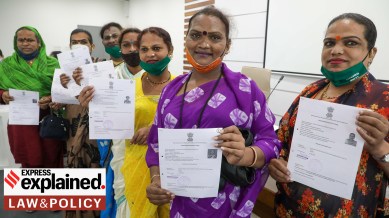Why Karnataka HC held transgender people can change their name and gender on birth certificates
What does the law say about transgender people changing their name and identity on official documents, such as Aadhar card, passport, and others?

Five years after the Transgender Persons (Protection of Rights) Act, 2019 came into force, the Karnataka High Court has stepped in to allow a transgender woman to change the name and gender on her birth certificate. She was denied this previously, even though it is explicitly permitted under the 2019 Act and subsequent rules.
Why was her request denied? And what is the process for a transgender person to get their name and identity changed in official documents?
Refusal to accept change in identity leads to a ‘dual life’
The petitioner in Ms. X vs State of Karnataka (2024) was diagnosed with gender dysphoria, which refers to discomfort with one’s gender identity. Gender identities (such as boy, girl) are assigned at birth based on sex organs. However, over time, gender has been distinguished from sex (which refers to biology), with gender understood as a social identity.
In this case, the petitioner chose to undergo a sex-reassignment surgery and change her name. To ensure her official documentation reflected this, she had her name and gender identity changed on her Aadhaar card, driving license, and passport. However, when she applied to change the information on her birth certificate, the request was rejected.
The Registrar of Birth and Deaths (the Registrar) in Mangalore informed her that The Registration of Births and Deaths Act, 1969 — the law governing the granting of birth and death certificates — only permits changing a birth certificate if the information is “erroneous” or the information was entered “fraudulently or incorrectly” (Section 15).
She then challenged the Act in the Karnataka HC, arguing in her petition that Section 15 was “extremely restrictive” and curtailed her right to life with dignity under Article 21 of the Constitution “as the name is an expression of the identity of a person”. She also claimed that documents showing different identities “leads to a dual life, one on documentation and one in reality, and this is and can be in the future a cause for harassment and discrimination”.
The state of Karnataka argued that the Registrar can only act according to the 1969 Act.
The Karnataka HC on special laws vs general laws
The Transgender Persons (Protection of Rights) Act, 2019, states that transgender people can be issued a “certificate of identity” as proof of their identity (Section 6) which can be revised if they choose to opt for a sex-reassignment surgery (Section 7).
The law explicitly says the gender of a transgender person “shall be recorded in all official documents” per this certificate. It also states that anyone having this certificate or a revised certificate “shall be entitled to change the first name in the birth certificate and all other official documents relating to the identity of such person”.
The detailed procedure for obtaining this certificate can be found under the Transgender Persons (Protection of Rights) Rules, 2020, which also has a list of “official documents” that includes “Birth Certificate” as the first entry.
Referring to these provisions and the 2020 Rules, the Karnataka HC held that the 1969 Act as a “general enactment” must comply with the Transgender Persons Act which is a “special enactment”.
General enactments refer to laws which apply broadly to a range of situations, such as the 1969 Act which applies mostly to all issues relating to birth and death certificates. Whereas, special laws govern specific subjects, like how the Transgender Persons Act is specifically aimed at protecting the rights of transgender people or how the Prevention of Money Laundering Act, 2002, deals with the crime of money laundering.
By stating that the 1969 Act must comply with the 2019 Act, the Karnataka HC implemented a well-settled rule of legal interpretation called “generalia specialibus non-derogant”, which roughly translates to “the special shall prevail over the general”.
The idea is that a general law should not get in the way of a law meant to deal with a specific issue, such as how people accused of money laundering or terrorism must overcome a higher bar to receive bail, in comparison to those accused of an offence under the Bharatiya Nyaya Sanhita (BNS).
The Karnataka HC held that the Registrar must recognise a certificate under the Transgender Persons Act and issue a birth certificate with the name and gender identity corrected “until suitable amendments are made to the Act of 1969”.
The application process for a certificate under Transgender Persons Act
To receive a certificate of identity under the Act, the person must follow the process provided in the Transgender Persons Rules. They must first file an application with the District Magistrate, along with an affidavit declaring their gender identity. The DM will process this affidavit and issue an identification number to the applicant that can be shown as proof of application. The rules state the certificate of identity and a transgender identity card will be issued within 30 days of receiving the application and the affidavit, or the Magistrate will reject the applications with reasons within the same period.
Similarly, if a person undergoes a reassignment surgery, they can ask the Medical Superintendent or the Chief Medical officer to issue a medical certificate so they can apply again to the DM for a revised certificate of identity, which may be issued within 15 days.
If a person has already recorded a change in gender before the Act came into force, they do not need to apply for a certificate.
Any authority responsible for issuing an official document (such as an Aadhaar, driving license, birth certificate etc.) is required to change “the name or gender or photographs or any of this information of the applicant in the official documents” within 15 days of receiving an application from a transgender person with a valid certificate of identity.